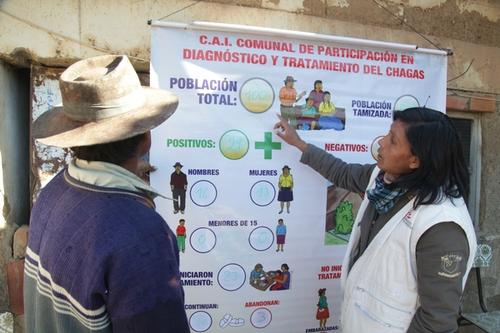The inhabitants of San Pedro Pochutla municipality and Mazunte town, within Santa María Tonameca municipality, in Oaxaca state, Mexico will be able to access Chagas disease diagnosis and treatment as a result of the agreement signed by the international medical humanitarian organisation Médecins Sans Frontières (MSF) and the Secretary of State for Health.
Comprehensive care model “The project, that will last two years, seeks to develop a comprehensive care model within the health system ensuring the diagnosis and treatment of people living with the disease,” says Marc Bosch, MSF general coordinator in Mexico. “The idea is that it may be replicated to other areas where Chagas is also endemic to benefit as many patients as possible.”
Supporting health facility
Through the project MSF plans to provide technical support to health facility staff in the intervention area with the objective to attract, diagnose and treat patients living with Chagas disease. The estimated prevalence of the disease among the population in the area ranges between 4% and 12%.
Vector Control Programme
The intervention will also support the Vector Control Programme seeking to eradicate the insect carrying the disease in the intervention area and train medical staff in prevention of mother-to-child transmission and safe transfusions. MSF will also support the supply of rapid diagnostic tests, electrocardiograms and the medicines Benznidazole and Nifurtimox to treat patients during the first six months of the project.
Since 1999, MSF has been offering free Chagas diagnosis and treatment, through projects opened in Honduras, Nicaragua, Guatemala, Colombia, Bolivia, Paraguay and, more recently, Italy and Mexico. To date, MSF has tested over 90,000 people for Chagas and treated more than 6,000 patients.
Chagas disease is a systemic, chronic parasitic disease transmitted by vectors (through the faeces left by triatomine insects or kissing bugs contaminated by the parasite); through contaminated food (oral transmission); through contaminated blood transfusions, or from mother to child (congenital).
The pathology is endemic in 21 countries in the Americas, but infected migrants may carry it to non-endemic countries as has been seen in the past years. It is estimated that in the American region nearly 100 million people are at risk of contracting the disease, and about 8 million are already infected. More than 95% of those already infected have never had access to diagnosis, let alone treatment. Every year there are an estimated 56,000 new cases, causing 12,000 deaths a year.



